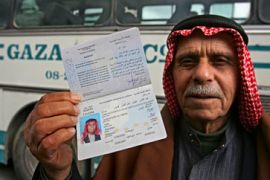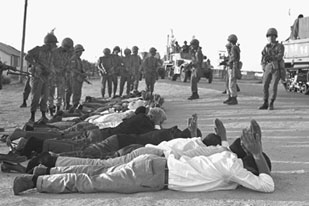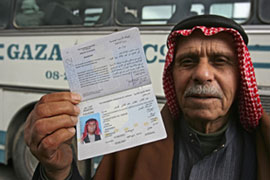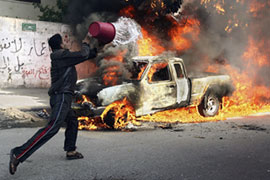Hearts outside the heartland
The 1967 war has left more than 800,000 Palestinians unable to return home.

 |
| Over the course of the war Israel took control of the Gaza Strip [GALLO/GETTY] |
By some estimates, one in three of the world’s refugees is a Palestinian.
While the majority are from families displaced in 1948 after Israel’s establishment, a second group came in the aftermath of the 1967 war when Israel took swaths of territory populated by Arabs.
Hasan al-Balasi, now a successful businessman in Doha, Qatar, was 10-years old when the war broke out.
He was living near Hebron, in the Aroub refugee camp, which housed Palestinians from 56 villages lost to Israel in 1948.
He told Al Jazeera: “I was asleep when the war started and I remember my family made me get up. They said we had to hurry and we went into the hills to hide.
| Background |
“When we got there the children took up sticks and we said we were going to fight the Jews,” he says.
The next day, Israel captured Hebron and took the Aroub refugee camp.
“They made us all crouch on the ground … there was one man with [the Israelis] who was wearing a black hood so we didn’t know who he was. He would select people and tell the Israeli soldiers to take those people away.”
Refugees
Forty years on, al-Balasi sits in his Doha office, drinking coffee with his friends, Dr Ahmad Saleh and Majeed al-Bargouthi, a Palestinian writer and poet. All three lost their homes as a result of the 1967 war and they have not been back.
| Special report | ||
|
|
At the outbreak of the conflict, Saleh’s family was living in Tulkarem, in the West Bank.
“In 1967, I would have been a boy of 12 or 13 years, with dreams that we would go back to our 1948 land,” he says.
Instead Saleh’s family fled, abandoning their home.
Al-Bargouthi, his friend, had been a student at a university in Jordan when the war began.
“At the university we had lots of factions,” he said. “Nationalistic movements, communist groups, Islamic groups… We believed the Arabs would liberate Palestine.
When they heard Jerusalem had fallen to the Israelis, the students feared an air raid and moved their mattresses into the university basement.
“We wondered if they would come and take Amman,” he said.
The students need not have worried, but over the course of the war, Israel captured East Jerusalem, the Gaza Strip, the West Bank and Syria’s Golan Heights.
A census from 1967 showed that nearly one million Arabs lived in these lands at the time.
Wave of refugees
The war prompted a second flight of refugees, not nearly as many as in Al-Nakba (The Catastrophe) of 1948, but a smaller wave – a “Naksa”, not a tragedy, simply a “set back”.
 |
| Those from Gaza were issued with temporary identification documents [GALLO/GETTY] |
Some, such as al-Balasi, had fled from Israel in 1948 and now left their homes for a second time.
Figures from Badil, an organisation that runs the Resource Centre for Palestinian Residency and Refugee Rights, show an estimated 430,000 Palestinians fled their homes in 1967.
More than 190,000 of them were displaced for a second time.
Forty years on, a new survey from Badil puts the number of Palestinian refugees from the 1967 war at 834,000.
More than 90 per cent of those who left their homes in 1967 went to Jordan.
Although those who fled from the West Bank were, by 1967, effectively Jordanian citizens and eligible for some form of state benefit, those from Gaza, which had been under Egyptian control, were not.
“It’s those from the Gaza Strip that are in a more precarious position – they are the ones who may struggle to get access to healthcare, education and travel documents,” said Karine MacAlister, legal advocacy co-ordinator at Badil.
International aid
Unrwa, the UN agency that deals with Palestinian refugees, provides for those in Jordan, Lebanon, Syria, Gaza and the West Bank displaced since 1948.
It does not operate refugee camps, but it maintains facilities inside the camps, such as schools and community programmes.
“We have 500,000 school kids in our schools everyday,” said Matthias Burchard, the head of the agency’s Geneva office. “We continue schooling and healthcare facilities in Gaza even when the shooting starts.”
At the same time, Palestinian communities in Iraq, the US and elsewhere in the world are eligible for support from the UNHCR, the UN’s High Commission for refugees.
Forty years on
Refugee numbers have gradually increased as families grow but in Jordan, UN figures show only 18 per cent of all refugees registered with Unrwa remain in camps.
The refugees still rely on Unrwa services but 40 years on many Palestinian families have established new homes in Jordan for practical considerations.
|
“The passport is Jordanian, but the heart is still Palestinian”
|
“It doesn’t matter where they are,” al-Bargouthi says.
“Nobody who is offered the opportunity [to return to Palestine] would say no. The passport is Jordanian, but the heart is still Palestinian.”
Al-Balasi says: “They say the third generation will forget about Palestine, but we have told our children the stories of Palestine and they will not forget.”
The refugees “right of return” has proved a major stumbling block in Arab-Israeli negotiations, with Israel concerned that the influx of refugees would outnumber the Jewish population.
In February, a five-year old Arab peace initiative including the right of return was re-tabled in Mecca, Saudi Arabia, but Israel said the plan would not be acceptable without further negotiation.
Occupation
While the talking continues, life for Palestinians under occupation remains much harder than for most of the refugees.
 |
| Gaza has been left in poverty and the West Bank continues to see violence [AFP] |
Gaza remains poor and violence continues in the West Bank. Israel regularly raids both regions, often in response to rocket attacks by Palestinian groups.
“It is important to remember that with 1967, the vast majority [of Palestinians] stayed in place and they have been much worse off,” says Burchard.
Al-Bargouthi adds: “Yes, people outside have a sense of guilt about it. We are comfortable and perhaps we have more money, but we are the same people.”
However, he says a “partition” remains: “The people inside say you have no right to criticise us because you are not here.”
While violence continues in the occupied territories, the men in al-Balasi’s office agree that one day they would like to go back.
“If you cut open a Palestinian heart,” al-Bargouthi tells Al Jazeera, “you will find inside it Palestine.”

